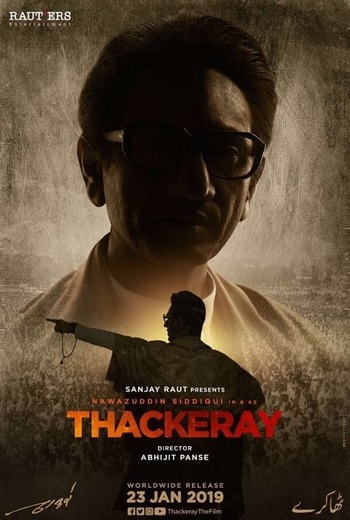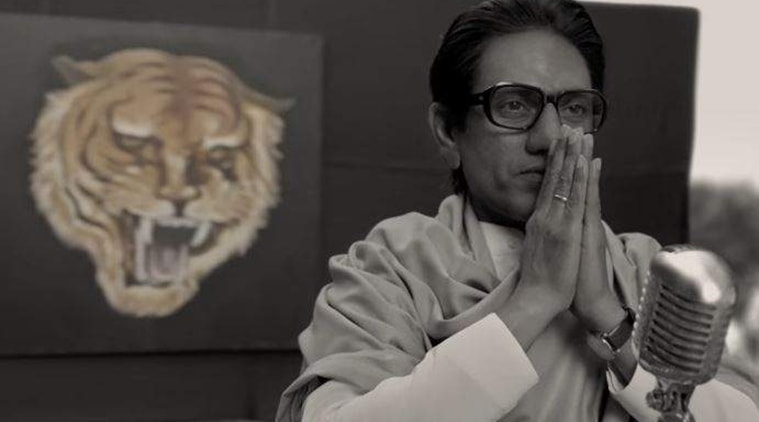Thackeray ทักเกอเรย์ (2019) [ บรรยายไทย ]


หมวดหมู่ : หนังดราม่า , หนังชีวประวัติ
เรื่องย่อ : Thackeray ทักเกอเรย์ (2019) [ บรรยายไทย ]
ชื่อภาพยนตร์ : Thackeray ทักเกอเรย์
แนว/ประเภท : Biography, Drama
ผู้กำกับภาพยนตร์ : Abhijit Panse
บทภาพยนตร์ : Abhijit Panse
นักแสดง : Nawazuddin Siddiqui, Amrita Rao, Nikhil Mahajan
วันที่ออกฉาย : 25 January 2019
จากนักวาดการ์ตูนที่สร้างกระแสวิจารณ์มาเป็นนักการเมืองใหญ่ในมุมไบ ภาพยนตร์ชีวประวัติเรื่องนี้เล่าถึงการขึ้นสู่ความนิยมของบาล ทักเกอเรย์ ผู้ก่อตั้งพรรคฝ่ายขวา "ศิวะเสนา"

IMDB : tt7777196
คะแนน : 5.1
รับชม : 236 ครั้ง
เล่น : 13 ครั้ง
Thackeray is a worshipful home video in the guise of a full-length feature film, in which everything is seen solely through the eyes of the man who started life as a testy, outspoken cartoonist, and who, overcome by the ‘unfairness’ of ‘Marathi manoos’ having to deal with migrants in their home-state Maharashtra, went on to form the Shiv Sena, a political party whose ‘reactions against actions’ helped changed the face of nation.
You cannot expect any subtleties in a film like this (its producer is a member of the Shiv Sena), which conveniently terms some of its portions, ‘kalpanik natya rupantar’. In Nawazuddin Siddiqui’s impersonation of the pipe-smoking, beer-swilling Bal Keshav Thackeray, the Shiv Sena beliefs are delivered with the force of a sledge-hammer: Gujaratis, Parsis, South Indians, and job-seekers from other states, have taken over Maharashtra, so out goes the demeaning slogan — ‘hatao lungi, bajaao pungi’. The murder of a communist leader takes place in a suitably atmospheric sequence: violence against anyone who doesn’t fall in line is fine. The Emergency was okay only because the country would finally be disciplined (Mrs Indira Gandhiis shown to soften towards the Shiv Sena supremo after a long face-to-face meeting, which a conniving non-Maratha in her cabinet almost didn’t allow to take place). There’s no hope for the Muslims, because every time there’s a hand held towards them, they bite it, so, hello, Hindutva.

The film opens with Balasaheb facing trial in a court-room which has a judge with a South Indian accent, and a lawyer who is made to mouth tough questions, only so that Thackeray can shut him up with smart reversals, which then becomes the last word on the subject. All demagogues are expert at pitching their point-of-view as the only truth, and Thackeray has no trouble in proudly terming himself the ‘Hitler of Maharashtra’, as he was the only one with the best interests of ‘his people’ at heart.
Is he an enemy of democracy? What democracy, asks the man in the dock with a righteous smirk, when there is no ‘nyay’ for the people of this country, when people are dying because there is no law and order?
Irony doesn’t just die when Thackeray mouths these things. Almost every moment in the movie is a death of irony, the biggest of them being that Nawazuddin Siddiqui, an outsider on both counts of community and religion, plays Balasaheb Thackeray. That Nawaz plays him with flair and conviction, spewing his brand of persuasive polarisation only to make it appear as the most reasonable thing, is the deepest cut.
That this film, which makes a hero out of man who normalized politics based on division, finds vocal adherents other than the card-carrying members of his party (in the selective cherry-picking process, there is no mention of the breaking away of nephew Raj Thackeray and the formation of his Navnirman Sena, as well as the second wave of retaliatory riots in which thousands of Muslims were killed in Bombay in 1993) says something for the times we are living in.
When Thackeray says, ‘we didn’t destroy any masjid; we only moved it away’, several cheers went up in the theatre I was in. I watched this film swinging between unease and admiration: the former for how easy it is to create rabid, bloody difference amongst people and create a lasting legacy, and the latter for just how well a skilled actor can portray a man who prided himself on kindling that difference.














